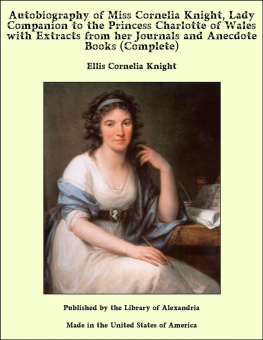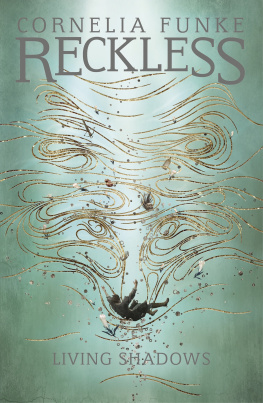This edition is published by Papamoa Press www.pp-publishing.com
To join our mailing list for new titles or for issues with our books papamoapress@gmail.com
Or on Facebook
Text originally published in 1937 under the same title.
Papamoa Press 2017, all rights reserved. No part of this publication may be reproduced, stored in a retrieval system or transmitted by any means, electrical, mechanical or otherwise without the written permission of the copyright holder.
Publishers Note
Although in most cases we have retained the Authors original spelling and grammar to authentically reproduce the work of the Author and the original intent of such material, some additional notes and clarifications have been added for the modern readers benefit.
We have also made every effort to include all maps and illustrations of the original edition the limitations of formatting do not allow of including larger maps, we will upload as many of these maps as possible.
SOUTH AFTER GETTYSBURG
Letters of CORNELIA HANCOCK from the Army of the Potomac
18631865
Edited by
HENRIETTA STRATTON JAQUETTE
FOREWORD
THE Florence Nightingale of America, Captain Charles Dod called Cornelia Hancock as he wrote to his mother of the ministering care he received when taken seriously ill during the Civil War at City Point Hospital. This was before the days of Red Cross with its roll of enlisted trained nurses ready for war or disaster, with first-aid kits, hospital supplies, and a system that has stood the test of many experiences, In 1863, nurses were volunteers, with ingenuity and pressure of necessity their only teachers. It was as assistant to her sisters husband, Dr. Henry T. Child, of Philadelphia, that Cornelia Hancock reached the battlefield after Gettysburg, and again after the Battle of the Wilderness, but the place she made for herself with the army doctors and with her grateful soldier patients ensured to her, in spite of her youth, continuous service in a Second Corps Hospital until Richmond was taken. These lettersto her mother at home, to her sister in Philadelphia, to her brother, and to young nieces and nephewscover the two years of her volunteer service as nurse.
Hancocks Bridge, her birthplace, was a remote tiny village four miles beyond Salem, in southern New Jersey. Once it had been the scene of stirring events in Revolutionary days, and a hundred years before that Cornelias ancestors were pioneer settlers from England, coming to this country just after William Penn. Service as colonial legislators and judges, martyrdom in the Revolutionary War, and a sturdy part in the development of a new nation were in her blood, but in the quiet country life which contented her father, opportunity for her as a woman was confined to teaching in the village school, or marriage. She longed to be in the midst of things herself when her only brother and her cousins went to the War against the South in 1862, and she began canvassing every possible opportunity to follow them. She felt she could be of use; though she did not know of the many ways which would open to her laterduring the War; after it in the South among the Negroes; and later in Philadelphia among the poor and neglected of a great city.
When the War was over, she turned eagerly to other fields of usefulness. Her few months experience among the contraband-escaped Negro slavesin Washington in the winter of 186364 convinced her of the Negroes need for help and education; so, under the auspices of the Philadelphia Yearly Meeting of the Society of Friends, she went south in 1866 with Laura Towne to help start schools. Their companionship on that journey to South Carolina showed Miss Towne that Cornelia Hancock had initiative and resourcefulness, so she sent her off on her own, and the Laing School was started in Pleasantville, South Carolina, by the courageous young Quakeress from Hancocks Bridge. A pioneer among Negro schools, it still continues its work.
After ten years in South Carolina, Cornelia Hancock came north and went with friends to England. Here she was interested in Great Britains problem with its growing number of poor. She gained access everywhere and learned how the older city of London met these problems. From the Old World she brought back to Philadelphia ideas about organized and constructive help for the needy, and about housing in the poorer districts of the city. In the home of her brother-in-law, Dr. Henry Child, at 634 Race Street, already well known as a center of humanitarian and advanced ideas, the Society for Organizing Charity was born in 1878the society now known the country over as the Family Society of Philadelphia. Cornelia Hancock was herself one of the first social workers, as Superintendent having charge of the poor in the Sixth Ward. The theory that a worker, giving fully of her time and energies and growing skill in helping people, should serve not only the interests of the people needing help but the desires of those who had means and wanted to help, was a personal philosophy growing from her experience with the Army and in Negro schools of the South. It is the philosophy of modern social work.
Work with the families of the Sixth Ward of Philadelphia convinced her of the need for special aid to children, and so in 1882 with other concerned persons she helped to found the Childrens Aid Society and Bureau of Information, now known as the Childrens Aid Society of Pennsylvania. She was on the committee which engaged the first paid worker for the new society, and her minutes as secretary of that first Board of Directors reflect her own philosophy:
We have been anxious not only to do something, but to do it well: to guard the child and to guard society: to help the suffering little one of today, and not, at the same time, to create a pauper for tomorrow. We cannot reconcile it to an enlightened conscientiousness in charity to act without inquiry, blindly trusting that the kind motive will ensure beneficient results.
She was active on this first Board of the Pennsylvania Childrens Aid until her resignation in 1895.
Meantime, in 1884, she became the agent and co-worker of Edith Wright in the management of the group of squalid houses known as Wrightsville. Though within Philadelphia City limits, it was well to the south, an isolated village housing many employees of the Philadelphia Gas Works, the Atlantic Refining Company, and of Peter Wright and Companys wheat wharves. The story of this experiment in the care of property covers every phase of the modern housing program: philanthropy was balanced by business sense; the same persistence was used with tenants as with municipal authorities, and better ways of living emerged, as Wrightsville grew to know and trust their new agent, Cornelia Hancock. Again she pioneered: this time in the social advancement of a whole community through housing, which, as she interpreted it, went beyond sanitation, public utilities and repairs, to improving the school system, providing a library, a savings bank, and recreational opportunities as well. She continued this community work until, by 1914, every tenant became his own landlord. Always her philosophy was to help people help themselves.
Cornelia Hancock died in 1926 at the age of 87. In her later years she talked often to her nieces and younger cousins of her many and varied experiences. It was to me, the granddaughter of a cousin, that she gave her letters written between the years 1863 and 1878. I have not attempted to recount all the activities of her long life; I have desired only to show that the qualities of mind and spirit evidenced by her letters during the years 186365 were inherent qualities determining her life work. She saw clearly what needed to be done at the moment and proceeded to do it, or to get it done in the most direct fashion. Results proved that her courage and resourcefulness were founded on intelligence and vision.












